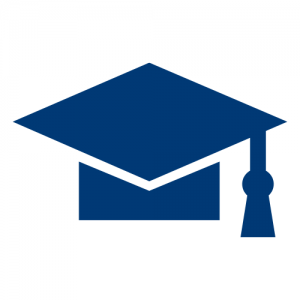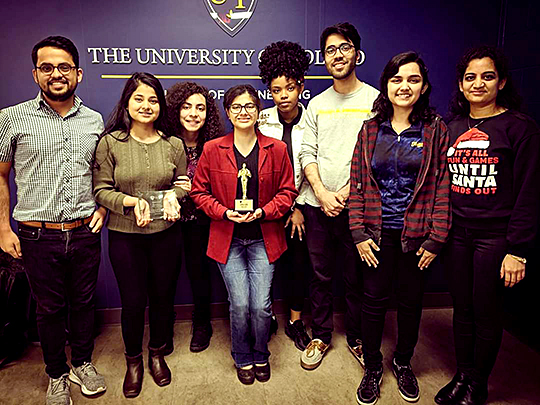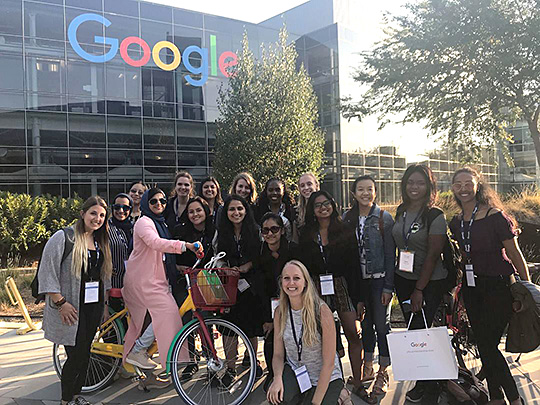Sheltering in place in sunny California, Naba Rizvi already misses the bells.
The University of Toledo first-generation college student is in San Diego taking her final classes online before she starts working remotely at Microsoft Research and begins earning her Ph.D. in computer science and engineering at the University of California at San Diego — her top choice — after graduation May 9.

CELEBRATING SUCCESS: During this time when we cannot come together to celebrate our graduates, UToledo is recognizing the Class of 2020 with a series of feature stories on students who are receiving their degrees. Help us celebrate our newest UToledo alumni. Visit utoledo.edu/commencement to share a message of support to graduates and come back online Saturday, May 9, to take part in the virtual commencement ceremony.
“My favorite memory will always be hearing the bells from University Hall first thing in the morning when I lived in MacKinnon Hall,” said Rizvi, who will graduate with a bachelor’s degree in information technology. “I hope I will someday get to return to Toledo, walk across Main Campus again, visit my former professors and colleagues at Engineering College Computing, and say goodbye in a proper way to the University that played a big role in shaping the person I am today.”
Rizvi, who has published research on human-computer interaction and interned with tech giant Adobe in Silicon Valley, is a student in the Jesup Scott Honors College who found great success while majoring in information technology in the College of Engineering.
She was one of nine students to win the Adobe Research Women-in-Technology Scholarship, one of 20 students to win the Google Women Techmakers Scholarship, and one of six recipients of the National Center for Women in IT’s Collegiate Award, to name a few of the many ways she has been recognized during the last few years as an outstanding female student studying computer science.
Rizvi is the founder of Non-Traditional Techies, a nonprofit organization with nearly 1,000 members increasing socioeconomic diversity in the technology industry by connecting passionate individuals from underprivileged backgrounds with opportunities.

Naba Rizvi, center, holds the trophy the UToledo Association of Computing Machinery Women’s Chapter received as the Outstanding New Student Organization in 2019.
At the forefront of initiatives related to gender diversity on campus, she also founded the UToledo Association of Computing Machinery Women’s Chapter.
Originally from Pakistan, Rizvi’s parents are now based in Saudi Arabia and her grandparents and sister live in Michigan.
Her journey through higher education started at Oakland Community College in Bloomfield Hills, Mich., where a recruiter told her about UToledo’s International Student Scholarship.
“I signed up for a campus visit and fell in love with Main Campus,” she said.
She credits the Honors College for access to additional scholarships and opportunities. She said it played a critical role in her ability to work by assisting with Curricular Practical Training, known as CPT, to complete her internships.

Naba Rizvi rode a bicycle outside the Googleplex in Mountain View, Calif., before posing for a photo with the other Google Women Techmakers Scholarship recipients during a retreat in 2018.
“Naba exemplifies what we hope all UToledo students experience — a passion for a subject and for helping others,” Dr. Heidi Appel, dean of the Jesup Scott Honors College, said. “What makes her extraordinary is that she’s using her experience and volunteer activities to shatter glass ceilings in her profession. We couldn’t be more proud.”
Rizvi’s skyrocketing success as an undergraduate in her field belies her uncertainty as a first-year student originally majoring in political science. But once exposed to programming, it was like flipping a switch.
“I discovered IT once I got to UToledo, and that’s when I discovered that I really enjoyed programming,” Rizvi said. “I immediately switched my major to IT and took all of the programming classes. I got involved with hackathons, and the rest is history.”
The five-time hackathon winner is an undergraduate research assistant in Dr. Kevin Xu’s research lab working on analyzing biological networks of antigens that affect kidney transplant survival.
“I have been thoroughly impressed with Naba’s ambition and initiative — she is the founder of UToledo’s Association of Computing Machinery Women’s Chapter and has turned it into one of the strongest student organizations on campus, regularly winning awards at hackathons all over the country,” said Xu, assistant professor in the Department of Electrical Engineering and Computer Science. “I believe Naba will become a tremendous researcher and, most importantly, that her research will have high societal impact.”
Rizvi is passionate about using computer science for social good, with a particular interest in breaking race, gender and accessibility barriers in education, healthcare and politics.
“Women are very, very underrepresented in computer science,” Rizvi said. “We make up less than 20% of the overall population of computer science majors, and now because of all the work we did with the Association of Computing Machinery Women’s Chapter, not only do they know that these opportunities are out there for them, but they have the passion and the courage to reach for them.”
While at Adobe, Rizvi worked on a project that helps blind people generate summaries of newspaper articles.
“That’s when I discovered my passion for developing assistive technologies for people with disabilities,” Rizvi said. “I’m hoping with all of these diversity initiatives, we can move toward a society where computer science is not just viewed as something for men. A lot of people from different backgrounds can see themselves as programmers or computer science researchers. I would really like to see the field that I’m in become more diverse and more open to different perspectives. I’m doing all I can to make that happen.”